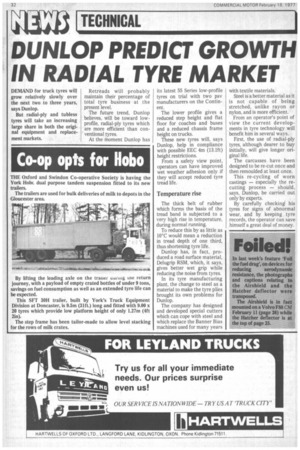DUNLOP PREDICT GROWTH IN RADIAL TYRE MARKET
Page 34

If you've noticed an error in this article please click here to report it so we can fix it.
DEMAND for truck tyres will grow relatively slowly over the next two to three years, says Dunlop.
But radial-ply and tubless tyres will take an increasing large share in both the original equipment and replacement markets. Retreads will probably maintain their percentage of total tyre business at the present level.
The future trend, Dunlop believes, will be toward lowprofile, radial-ply tyres which are more efficient than conventional tyres.
At the moment Dunlop has its latest 55 Series low-profile tyres on trial with two psv manufacturers on the Continent.
The lower profile gives a reduced step height and flat floor for coaches and buses and a reduced chassis frame height on trucks.
These new tyres will, says Dunlop, help in compliance with possible EEC 4m (13.1ft) height restrictions.
From a safety view point, operators can have improved wet weather adhesion only if they will accept reduced tyre tread life.
Temperature rise
The thick belt of rubber which forms the basis of the tread band is subjected to a very high rise in temperature, during normal running.
To reduce this by as little as I0°C would mean a reduction in tread depth of one third, thus shortening tyre life.
Dunlop has, in fact, produced a road surface material, Delugrip RSM, which, it says, gives better wet grip while reducing the noise from tyres.
In its tyre manufacturing plant, the change to steel as a material to make the tyre plies brought its own problems for Dunlop.
The company has designed and developed special cutters which can cope with steel and which replace the Banner Bias machines used for many years with textile materials.
Steel is a better material as it is not capable of being stretched, unlike rayon or nylon, and is more efficient. From an operator's point of view the current developments in tyre technology will benefit him in several ways.
First, the use of radial-ply tyres, although dearer to buy initially, will give longer original life.
The carcasses have been designed to be re-cut once and then remoulded at least once.
This re-cycling of worn castings — especially the recutting process — should, says, Dunlop, be carried out only by experts.
By carefully checking his tyres for signs of abnormal wear, and by keeping tyre records, the operator can save himself a great deal of money.








































































































